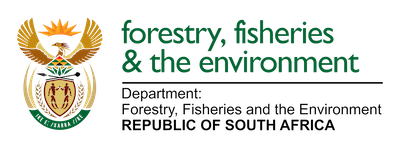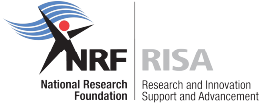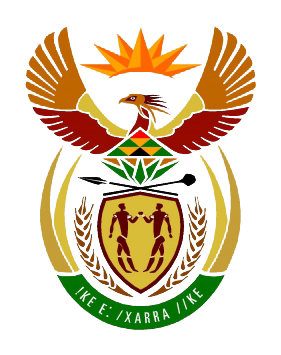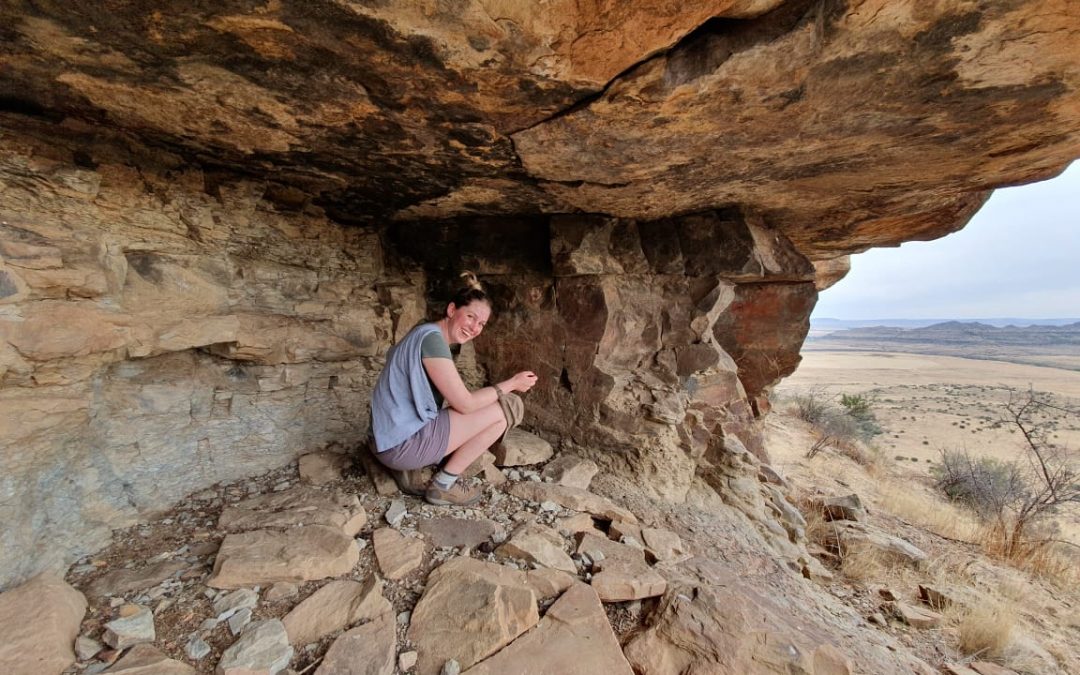
by Ria Olivier | May 23, 2020 | Antarctica, Geomorphology, Research, SANAP, SANAP Student, Science, Women in Science
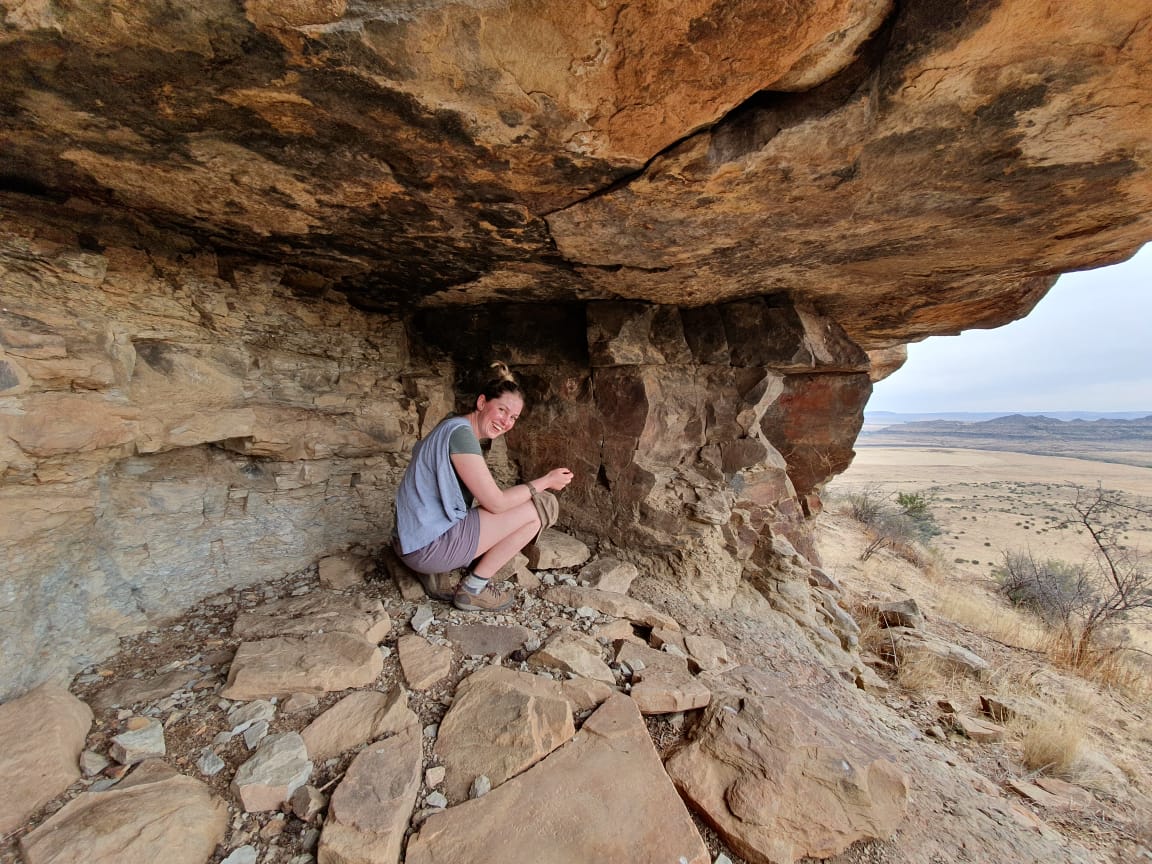 Liezel (Elizabeth) Rudolph obtained her Geography BSc and Honours degrees at the University of Pretoria, and a MSc at Rhodes University. She also has a PGCE from UNISA, which allowed her to teach Geography at Abbott’s College in Pretoria for a few years. She is currently in the final stages of her PhD (also in Geography) at the University of Fort Hare. She currently lectures Geomorphology at the University of the Free State. Her postgraduate research focussed on glacial and peri-glacial landforms and their response to (past and present) climate change. These studies afforded her opportunities to visit the research stations on Marion Island and in the Antarctic, working with SANAP-NRF funded programmes in geomorphology – Landscape Processes in Antarctic Ecosystems and Sub-Antarctic Landscape-Climate Interactions.
Liezel (Elizabeth) Rudolph obtained her Geography BSc and Honours degrees at the University of Pretoria, and a MSc at Rhodes University. She also has a PGCE from UNISA, which allowed her to teach Geography at Abbott’s College in Pretoria for a few years. She is currently in the final stages of her PhD (also in Geography) at the University of Fort Hare. She currently lectures Geomorphology at the University of the Free State. Her postgraduate research focussed on glacial and peri-glacial landforms and their response to (past and present) climate change. These studies afforded her opportunities to visit the research stations on Marion Island and in the Antarctic, working with SANAP-NRF funded programmes in geomorphology – Landscape Processes in Antarctic Ecosystems and Sub-Antarctic Landscape-Climate Interactions.
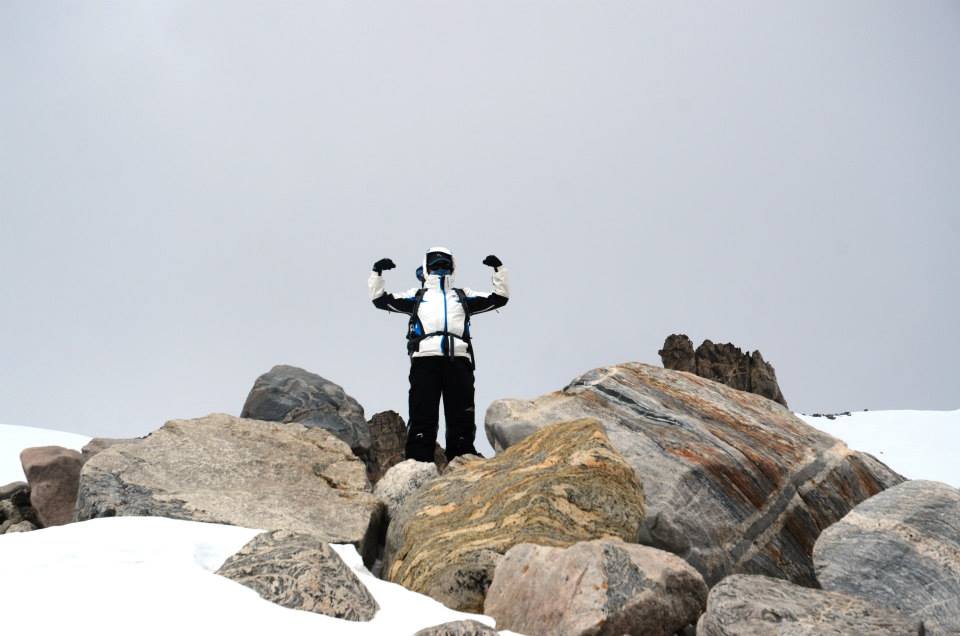
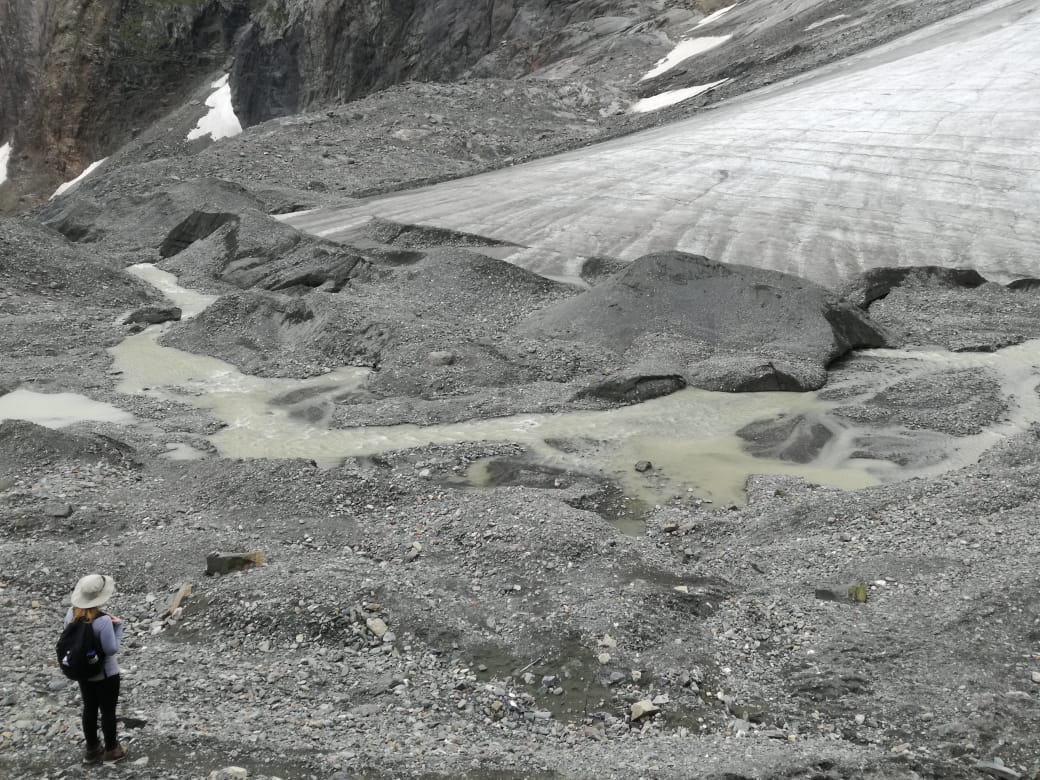
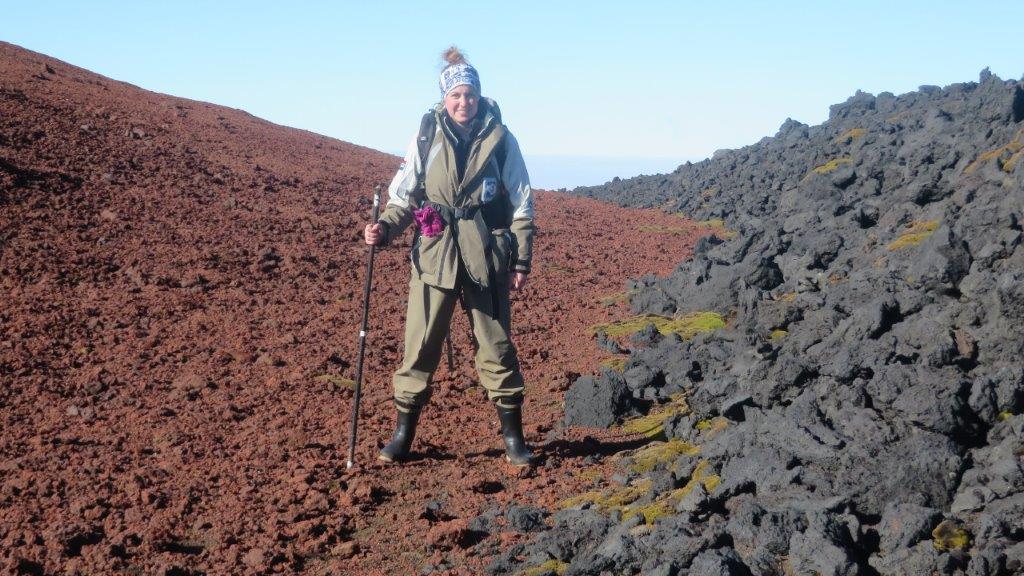
Where you come from where did it all started
I grew up in Pretoria. I never knew what I wanted to be when I grow up – all my friends had career aspirations, but I had interests. I liked variety and the thought of having one, predictable job for the rest of my life scared me endless. I had a keen interest in earth and physical sciences, but I also really enjoyed the arts and design. However, I was neither a Newton nor a Michelangelo at school and the prospect of either as a career path did not sit quite well with me. By the time I finished school I could still not decide on a single career and nothing in the university catalogues seemed to tick all the boxes. So, by process of elimination, I crossed out everything that sounded boring or would involve living creatures (I faint at the sight of blood), and the only thing that was left was Geography. I should’ve known – it’s a science that allows, no, encourages, variety of thought and expression. But I didn’t end up in research straight away. After I finished my Honours in Geography, I taught high school for a few years before returning to full-time studies to pursue a Masters. During my Masters though, I truly missed teaching. There’s something magical about sharing your passion on a subject with young people, and them getting equally excited about it. Its then that I realised a career where I can actively pursue my research interests, and teach, would be my dream job. I don’t believe I could’ve reached this realisation on my own. I had many mentors (parents, teachers, bosses, supervisors) who could lead, inspire and guide me. Through my post-school adult years, I didn’t always know how things will play-out, but I stuck to things I enjoyed and tried to do everything to the best of my ability. I could have followed a more predictable career path, but I may not have been so excited about it, as I am about what I get to do now. I am now lecturing Geomorphology at the University of the Free State and pursuing a PhD in Geography which, on top of everything, is on a topic I’ve been fascinated with since I first read a short story in my English class, at age 11 – glaciers.
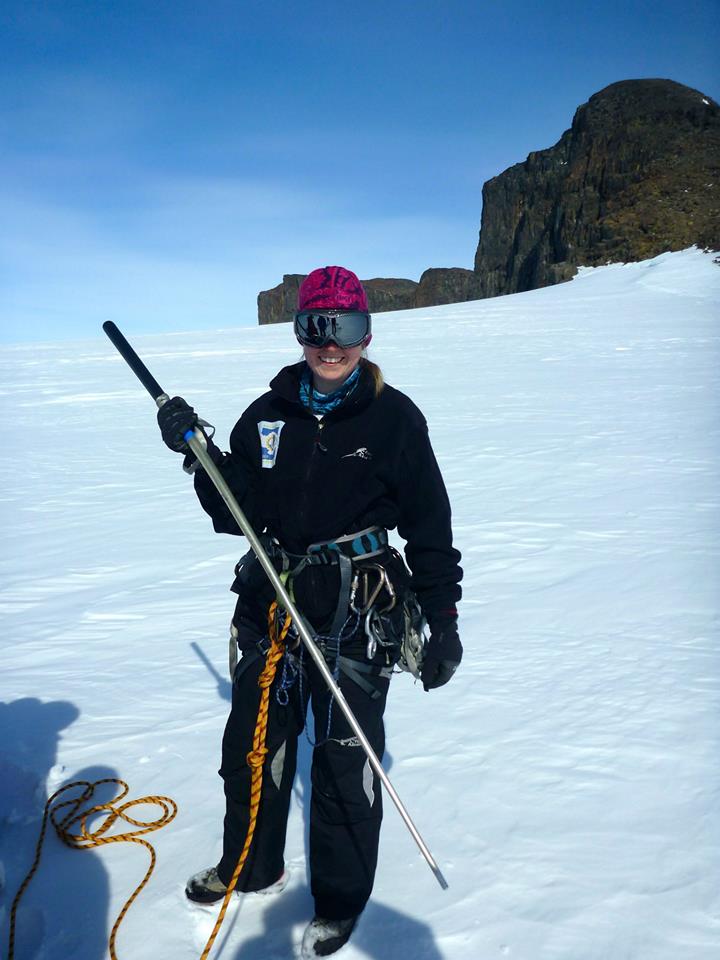
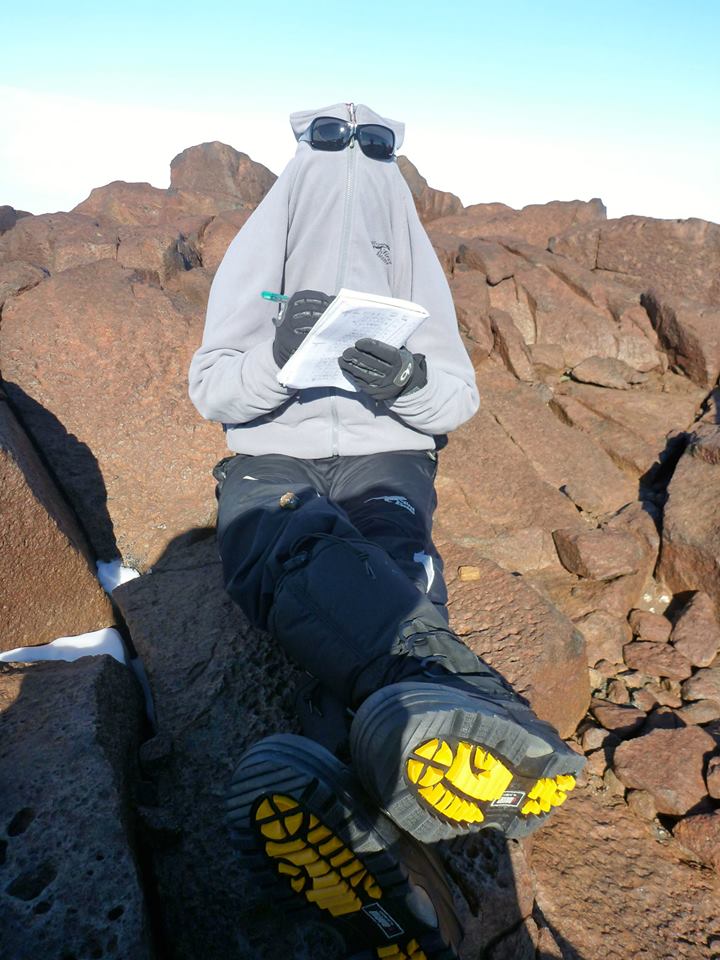
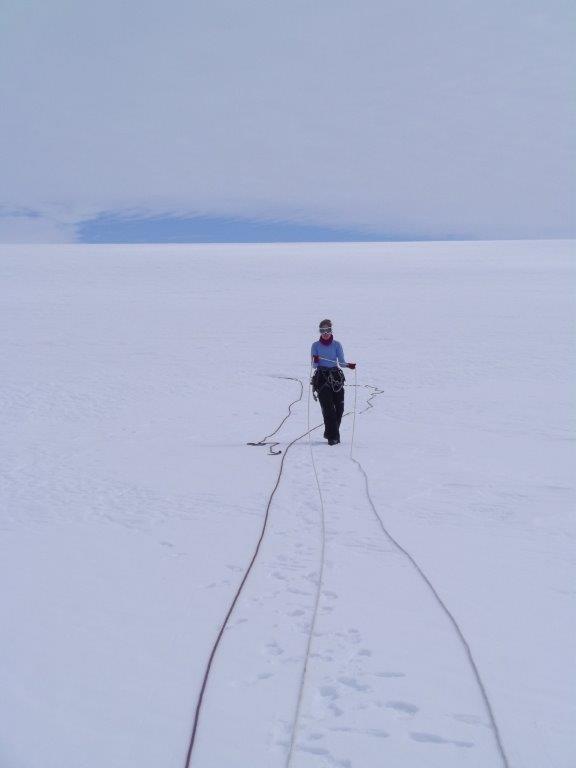
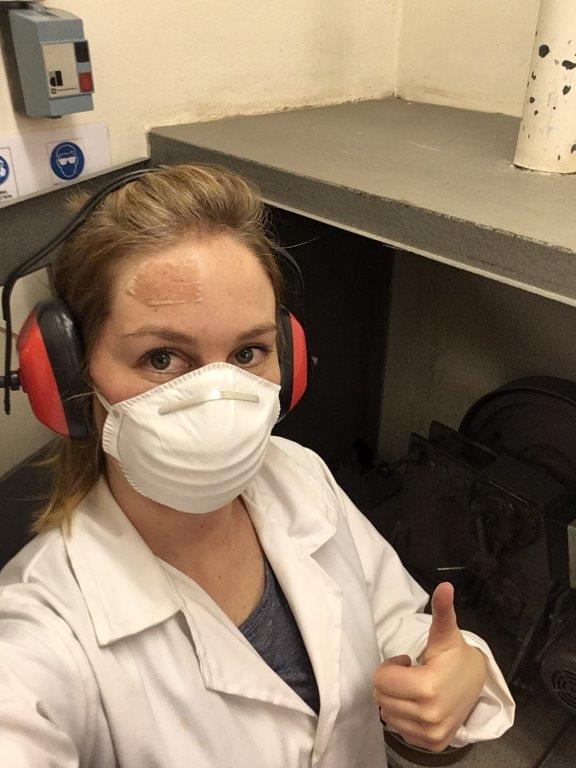
Why you love your career in science?
It never grows old. With new discoveries come a flood of new unanswered questions. It pushes your mental limits and if you like that sort of challenge, you won’t easily get bored. Geography, especially, allows you to think both critically and creatively – it’s like playing a game with rules, but you are allowed to invent new rules. It allows you to visit amazing landscapes (if you’re a Geographer) and meet new and interesting people. Perhaps the best part of is, that it allows you to explore something you are very curious about, and you get to share your findings with an audience that are interested. At the same time, you benefit from what others have discovered about their own curiosity. It’s a constant learning process. In my experience I’ve gotten to work with incredible minds in the Southern African Geomorphology community, and have had the privilege to meet world-class scientists form other fields within the greater SANAP community – all who very passionate about their research fields and to whom I owe much of my passion for science. I am currently serving on the Association of Polar Early Carer Scientists’ South African National Committee (APECSSA), which has awarded me the opportunity to meet other early career scientists, not only from the Earth Science field, but from the Ocean-, Biological-, Botanical- and Space-physics sciences, to name a few. I don’t know of many other careers that would you expose you to such a variety of people and places.
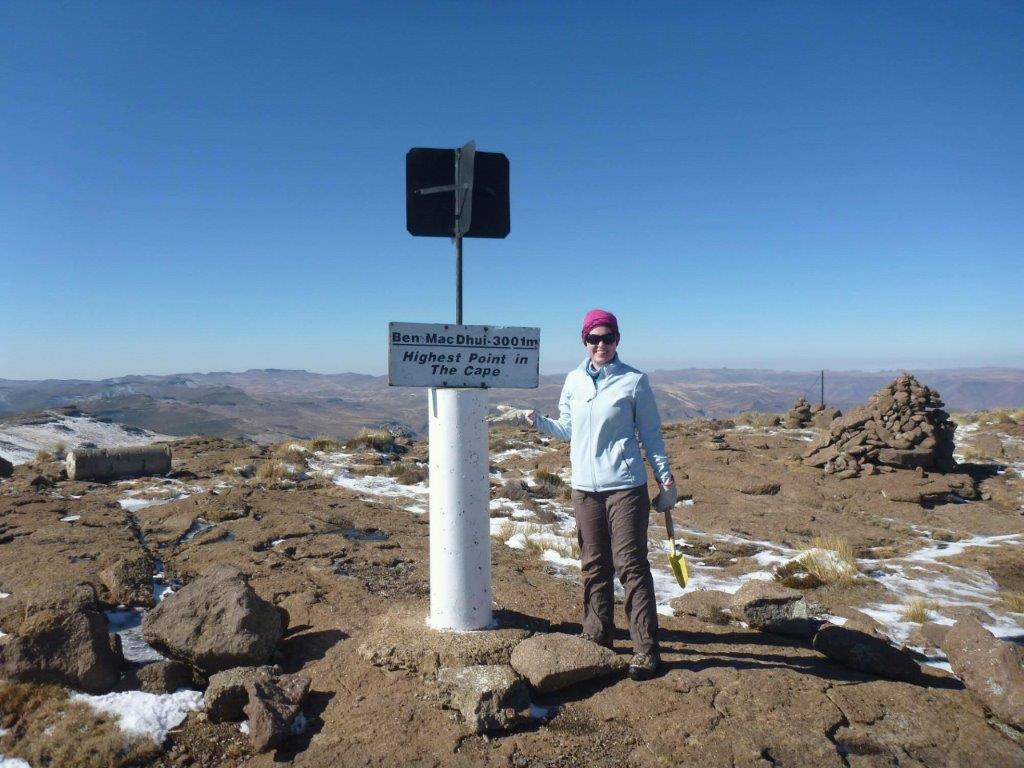
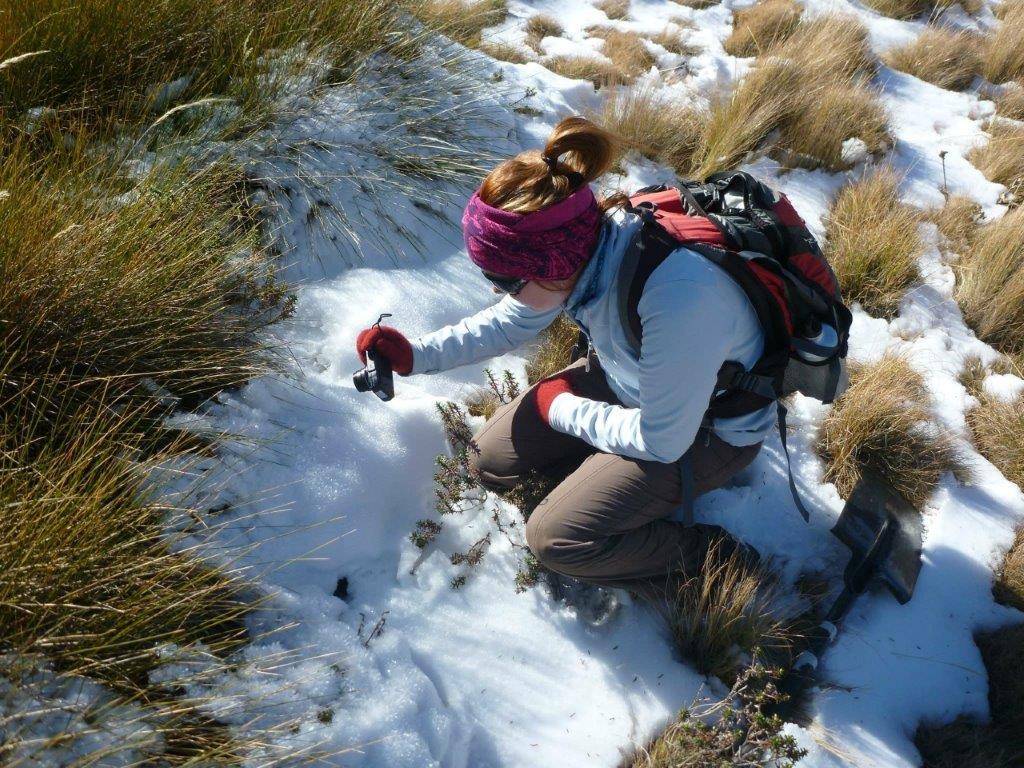

“Science is like art, perhaps with a few more rigorous guidelines, and it allows you to draw on your own unique talents – just like an artist has a specific style. So, you should play by the rules, but you don’t have to fit a mould. Find mentors and listen to their advice. Make your own decisions and take responsibility for yourself. Don’t do anything halfies – finish what you’ve started and do it properly, or leave it all together. I believe that no time spent doing something well, is ever time wasted – experience is what makes us human. People will always be more important than science, so value your personal and professional relationships.” – Liezel
Links:
google scholar: https://scholar.google.co.za/citations?user=lwGJSqAAAAAJ&hl=en
Facebook: https://web.facebook.com/apecssa/ ;
https://web.facebook.com/sanaplci/
Twitter: @Apecssa; @sanaplci
Interview: GrootOntbyt /GrootFM 90.5, a community radio station in Pretoria.
Interview: at Aktru research station, in Siberia.
Article: Early glacial maximum and deglaciation at
sub-Antarctic Marion Island from cosmogenic 36Cl exposure dating
Text and Images: Liezel Rudolph
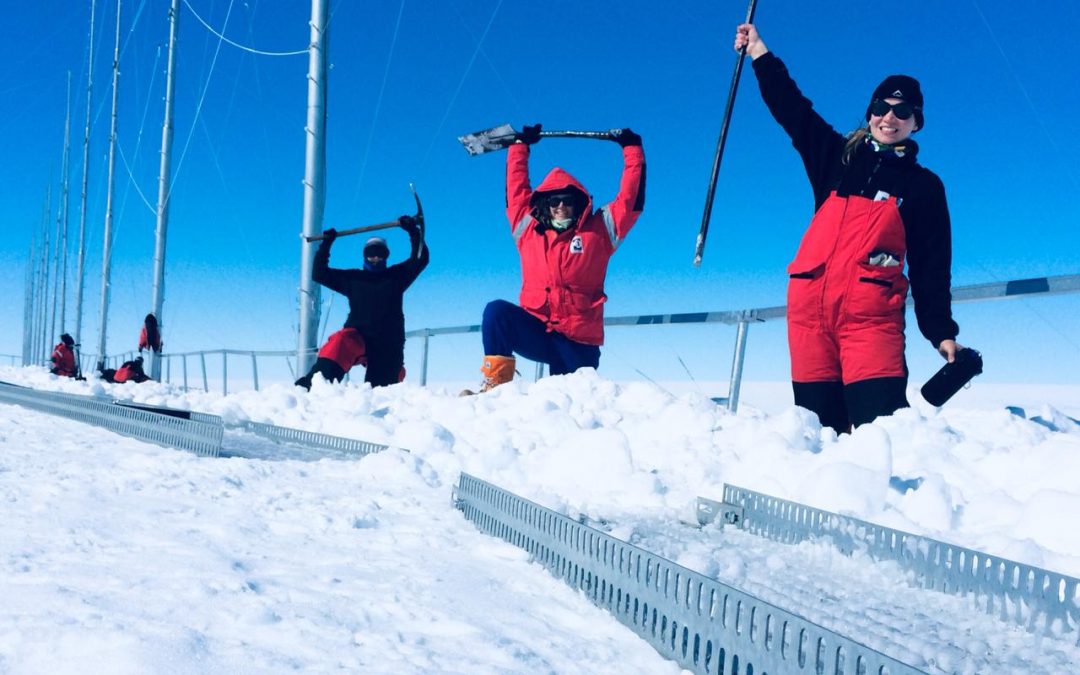
by Ria Olivier | Apr 17, 2020 | Antarctica, Legacy, SA Agulhas II, SANAE, SANAP, Science, Take-Over Operations, Women in Science
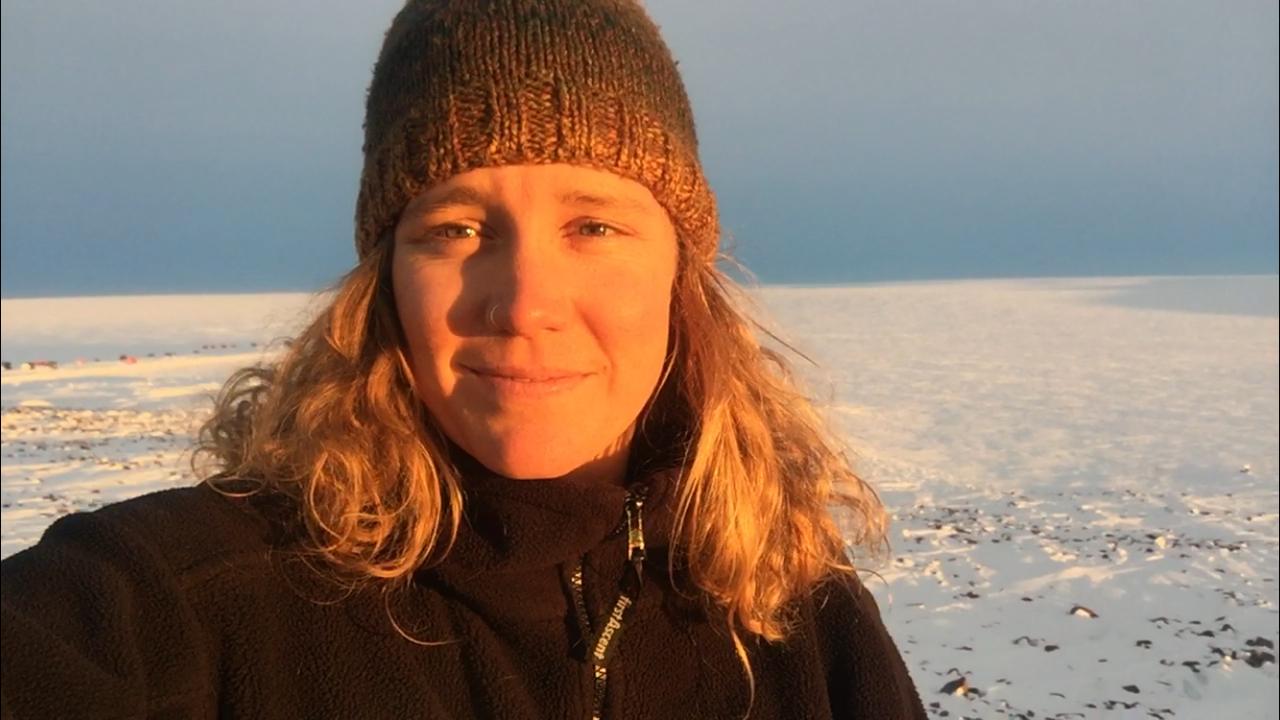 Jess Verheul grew up in Johannesburg, South Africa and has always had an affinity for the outdoors, wild and remote places, exploring, surviving and adventuring. She believes she might have been inspired and influenced by her grandparents being farmers; “we spent much time playing outside growing up. I loved being on the farm, and my parents took us on some great safari holidays when we were younger too”. She graduated with a Bachelor of Science degree, specialising in Geography and Environmental Management. In her third year (2009), her mom showed her an article in an old girls school newsletter, an article by a fellow former school girl, who had been in Antarctica as the overwintering Medical Doctor. This sparked a conversation which in turn started a personal obsession…Mission Antarctica, by any means necessary. Her sense of adventure and the will to explore, or a search for depth and resilience to struggle and experience the elements for one’s-self sparked this obsession.
Jess Verheul grew up in Johannesburg, South Africa and has always had an affinity for the outdoors, wild and remote places, exploring, surviving and adventuring. She believes she might have been inspired and influenced by her grandparents being farmers; “we spent much time playing outside growing up. I loved being on the farm, and my parents took us on some great safari holidays when we were younger too”. She graduated with a Bachelor of Science degree, specialising in Geography and Environmental Management. In her third year (2009), her mom showed her an article in an old girls school newsletter, an article by a fellow former school girl, who had been in Antarctica as the overwintering Medical Doctor. This sparked a conversation which in turn started a personal obsession…Mission Antarctica, by any means necessary. Her sense of adventure and the will to explore, or a search for depth and resilience to struggle and experience the elements for one’s-self sparked this obsession.
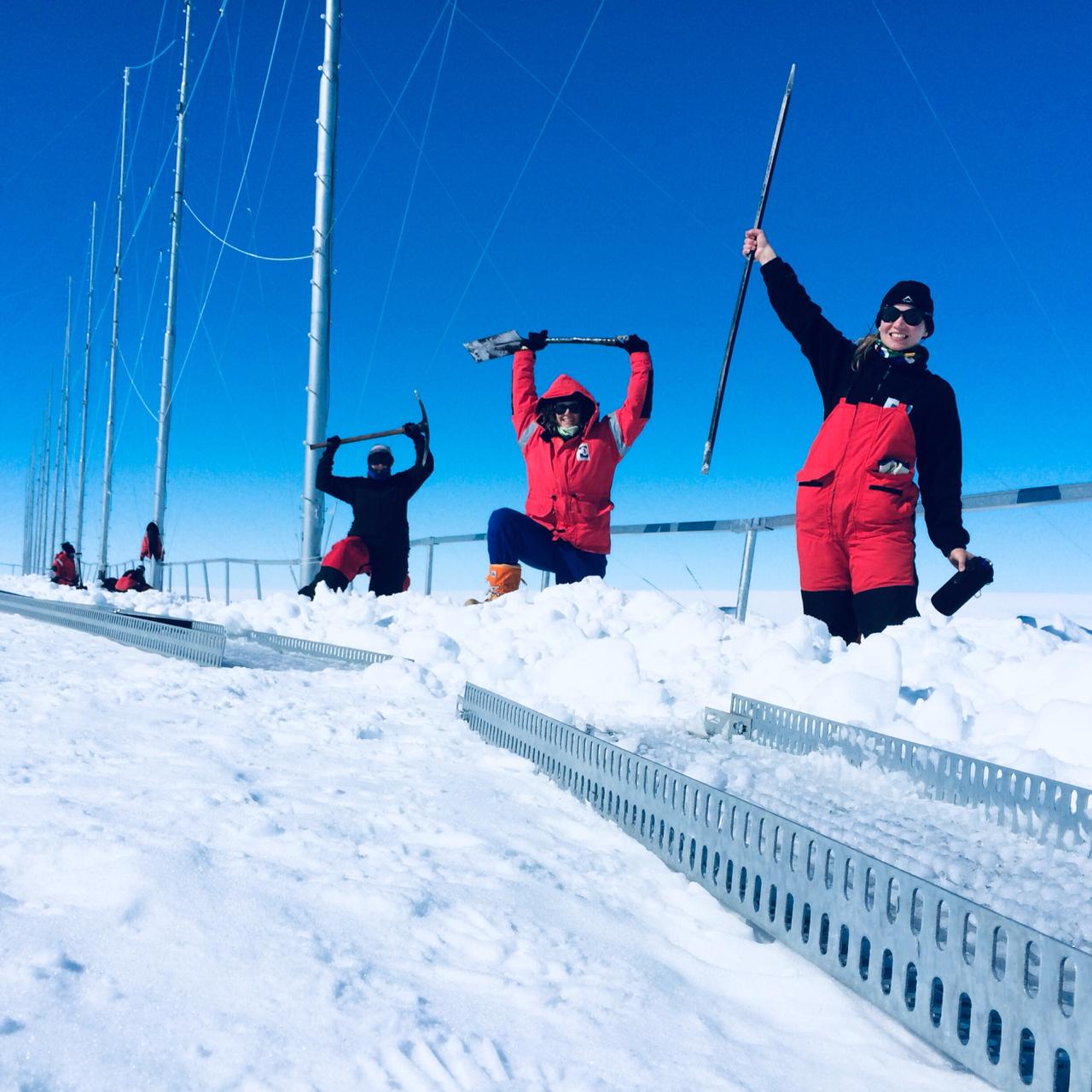
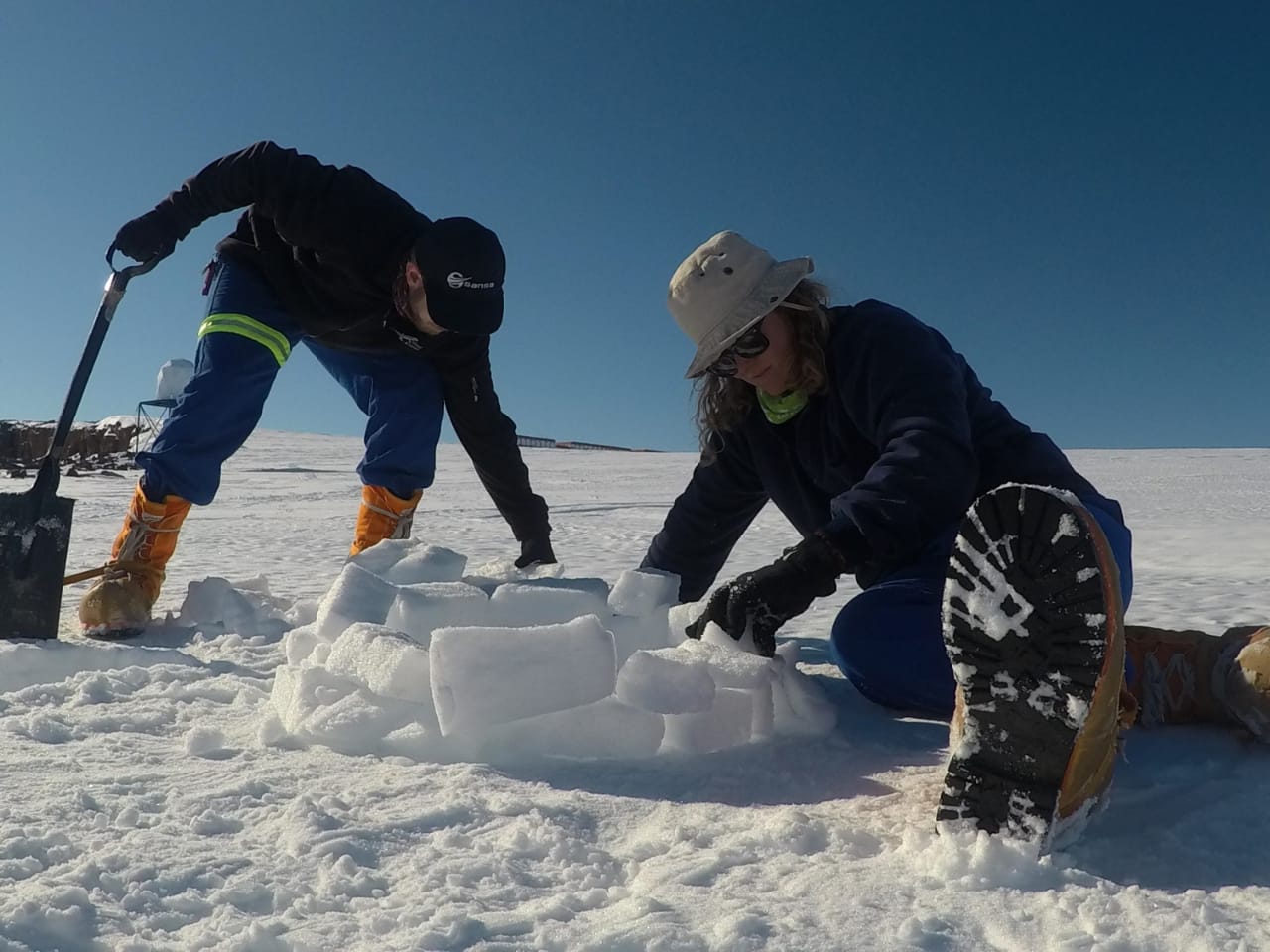 Jess completed her Master’s Degree in Environmental Management in 2012 and started working in the corporate consulting world. She relocated to Cape Town in 2014 and got involved as a volunteer firefighter and started experimenting more with creative hobbies like drawing and painting. In 2018 she was offered a volunteer position for the summer takeover to SANAE IV, South Africa’s Antarctic station located on the Vesleskarvet nunatak in Dronning Maud Land. She joined the South African National Space Agency (SANSA) team as a volunteer for the summer takeover expedition. As a member of a team of 10 people for SANSA undertaking upgrades and maintenance at SANAE IV over the summer takeover period from December 2018 to March 2019.
Jess completed her Master’s Degree in Environmental Management in 2012 and started working in the corporate consulting world. She relocated to Cape Town in 2014 and got involved as a volunteer firefighter and started experimenting more with creative hobbies like drawing and painting. In 2018 she was offered a volunteer position for the summer takeover to SANAE IV, South Africa’s Antarctic station located on the Vesleskarvet nunatak in Dronning Maud Land. She joined the South African National Space Agency (SANSA) team as a volunteer for the summer takeover expedition. As a member of a team of 10 people for SANSA undertaking upgrades and maintenance at SANAE IV over the summer takeover period from December 2018 to March 2019.
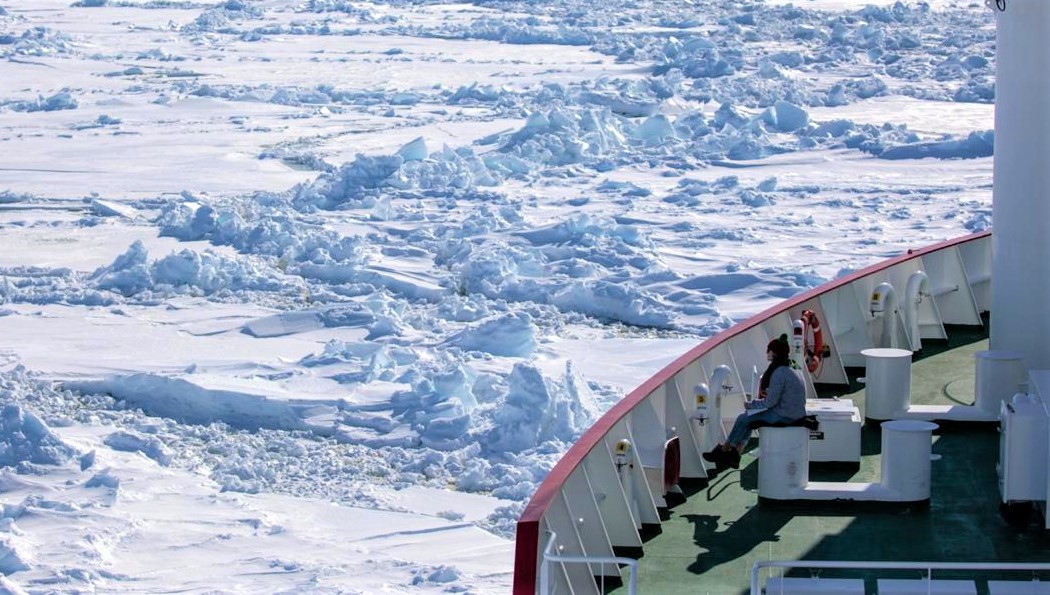 “Lacking a good camera but having a desire to experience this incredible place to the fullest, and knowing that drawing is a fantastic meditation; I treated myself to a blank sketchbook and some fine-liner pens before departing on our journey. I like creative expression. It helps me clear my head and experience a place or a situation more deeply.”
“Lacking a good camera but having a desire to experience this incredible place to the fullest, and knowing that drawing is a fantastic meditation; I treated myself to a blank sketchbook and some fine-liner pens before departing on our journey. I like creative expression. It helps me clear my head and experience a place or a situation more deeply.”
The SANSA Team didn’t have to do any work for the 11-day ship journey South, so she spent her time reading several books and did a bit of sketching. On the 19th of December the S.A. Agulhas II was close to the Fimbul Ice-shelf in Dronning Maud Land. Over the summer Jess spent approximately 100 hours in between work and chores, helping out and socialising; drawing, painting and studying the landscapes. “It was an unforgettable experience, one that still feels like a dream. I am ever grateful for the incredible opportunity. Since having spent all that time observing the place, I will remember it deeply for the rest of my days.”

 ANT{INK}TICA : There were initially no plans to publicise her art, but the opportunity was presented by the archivist at Antarctic Legacy of South Africa (ALSA) to publish it in a coffee table book. This is the first art publication from the Antarctic Legacy of South Africa. The book consists of 49 sketches and 3 poems, depicting scenes experienced by Jess during her Antarctic Expedition. Only 100 publications are available and will be signed by the artist. This publication will be a unique addition to Art Book Collections and Antarctic publications. Visit the website www.justjiggs.com to read more about the publication and place an order or contact riaolivier@sun.ac.za for more details.
ANT{INK}TICA : There were initially no plans to publicise her art, but the opportunity was presented by the archivist at Antarctic Legacy of South Africa (ALSA) to publish it in a coffee table book. This is the first art publication from the Antarctic Legacy of South Africa. The book consists of 49 sketches and 3 poems, depicting scenes experienced by Jess during her Antarctic Expedition. Only 100 publications are available and will be signed by the artist. This publication will be a unique addition to Art Book Collections and Antarctic publications. Visit the website www.justjiggs.com to read more about the publication and place an order or contact riaolivier@sun.ac.za for more details.
 Jess’ message to you: “To get out there, challenge yourself. To believe in yourself and your ability. To try new things. Try harder, to judge yourself less and to never give up. To appreciate the experiences and lessons you’ve been endowed with and to help others along their way”. . Jess’ hope is that this book will shine a light for you, to show you that anything is possible. That persistence pays. Magic exists. And every day is a gift. Life is short, don’t waste a second.
Jess’ message to you: “To get out there, challenge yourself. To believe in yourself and your ability. To try new things. Try harder, to judge yourself less and to never give up. To appreciate the experiences and lessons you’ve been endowed with and to help others along their way”. . Jess’ hope is that this book will shine a light for you, to show you that anything is possible. That persistence pays. Magic exists. And every day is a gift. Life is short, don’t waste a second.
Text: Jess Verheul Photo credits: Jess Verheul, Colin de la Harpe, ALSA
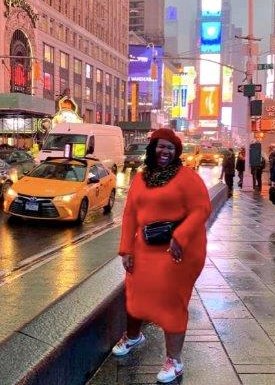
by Ria Olivier | Mar 21, 2020 | Research, SANAP, SANAP Student, Science, Southern Ocean, Women in Science
Every year new students are joining the South African National Antarctic Programme(SANAP). As Saturday is probably the time to break from studies, our first “Saturday Student” in the Mid-Month series is Kolisa Yola Sinyanya or for those who are familiar with Twitter, @Kolie_Yola. I think there are not many students out there with 7070 followers (during writing of this article) – but Kolisa does. She joined the Antarctic Legacy of South Africa (ALSA) Project and contributes towards our social media campaign, therefore letting more people know about South Africa’s involvement in the Antarctic and Southern Ocean region. Upon joining ALSA, Kolisa was set to be part of the South African group to attend the SCAR biennial conference in August 2020 in Hobart, Australia(but now cancelled).
probably the time to break from studies, our first “Saturday Student” in the Mid-Month series is Kolisa Yola Sinyanya or for those who are familiar with Twitter, @Kolie_Yola. I think there are not many students out there with 7070 followers (during writing of this article) – but Kolisa does. She joined the Antarctic Legacy of South Africa (ALSA) Project and contributes towards our social media campaign, therefore letting more people know about South Africa’s involvement in the Antarctic and Southern Ocean region. Upon joining ALSA, Kolisa was set to be part of the South African group to attend the SCAR biennial conference in August 2020 in Hobart, Australia(but now cancelled).
 She is a PhD candidate in Oceanography at the University of Cape Town (UCT). Her PhD research is part of a growing body of work that critically examines bio-geochemical cycling in the ocean, particularly regions that are currently under-sampled. The research aims involve exploring phytoplankton community dynamics and microbe-nutrient interactions in the Indian Ocean, including subtropical and Southern Ocean waters. To date, Kolisa has been awarded the Advancing Womxn Fellowship in the Department of Oceanography awarded under the “For womxn by womxn: conducting research in a field in which womxn are in short supply” category of a new initiative at UCT championed by the Office of the Vice-Chancellor. She is one of the researchers who were on 5-week cruise to Marion Island in the Sub-Antarctic Indian Ocean in 2017.
She is a PhD candidate in Oceanography at the University of Cape Town (UCT). Her PhD research is part of a growing body of work that critically examines bio-geochemical cycling in the ocean, particularly regions that are currently under-sampled. The research aims involve exploring phytoplankton community dynamics and microbe-nutrient interactions in the Indian Ocean, including subtropical and Southern Ocean waters. To date, Kolisa has been awarded the Advancing Womxn Fellowship in the Department of Oceanography awarded under the “For womxn by womxn: conducting research in a field in which womxn are in short supply” category of a new initiative at UCT championed by the Office of the Vice-Chancellor. She is one of the researchers who were on 5-week cruise to Marion Island in the Sub-Antarctic Indian Ocean in 2017.
Kolisa has a passion for learning science and for sharing her science, and her PhD has allowed Kolisa to engage  in effective science communication through public speaking, scientific writing and television features. In February of 2020, she presented one of her PhD chapters at Ocean Sciences Meeting in San Diego, USA. Towards the end of 2019, the new Advancing Womxn: Ocean Womxn Fellowship at UCT recruited Kolisa to run and manage their social media accounts as a science communicator. She was one of the invited African scientists who gave ocean and climate change related talks at #VirtualBlueCOP25. In the same year Kolisa was nominated as one of the Inspiring Fifty Women in STEM South Africa and became a Black Women in Science South Africa 2019 fellow. Kolisa was the first PhD candidate in history to be selected by the Oceanography Department’s head of department (HoD), Professor Isabelle Ansorge to stand in for her as acting HoD at a departmental graduation ceremony in 2019.
in effective science communication through public speaking, scientific writing and television features. In February of 2020, she presented one of her PhD chapters at Ocean Sciences Meeting in San Diego, USA. Towards the end of 2019, the new Advancing Womxn: Ocean Womxn Fellowship at UCT recruited Kolisa to run and manage their social media accounts as a science communicator. She was one of the invited African scientists who gave ocean and climate change related talks at #VirtualBlueCOP25. In the same year Kolisa was nominated as one of the Inspiring Fifty Women in STEM South Africa and became a Black Women in Science South Africa 2019 fellow. Kolisa was the first PhD candidate in history to be selected by the Oceanography Department’s head of department (HoD), Professor Isabelle Ansorge to stand in for her as acting HoD at a departmental graduation ceremony in 2019.
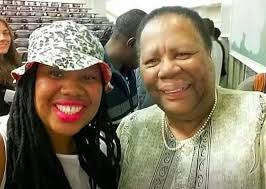 She has taken part in several science communication activities, including FameLab Cape Town, the biggest science communication competition in the world, where she was the Cape Town national runner up. Other thought- and conversation-provoking science communication engagements in which Kolisa has participated in are Pint of Science South Africa and TEDxUCT. Moreover, she presented the preliminary findings of her Agulhas System Climate Array (ASCA) research at the 2018 SANAP Symposium. Kolisa’s work has also been documented in the academic communication magazine, The Conversation Africa. She’s committed to increasing the visibility of women in STEM and runs a blog called Women In Science Hub where she write about conversations she has with women who are making waves in the world of STEM. In 2018, Kolisa had the privilege to be interviewed as a woman in science under the theme “#SHEsInSTEM” by the women’s organisation, Young&BosSHE, based in the United States. In 2019, her sci comm work was featured by Crastina in Sweden under the theme Science Communication Africa. As a student leader, she was invited by the Vice-Chancellor of the University of Cape Town, Professor Mamokgethi Phakeng, to participate in a Women’s Day discussion on Power FM about South African universities. In 2019 she was invited for live interviews twice by Cape Town TV to speak about Oceanography and on Women’s Month to speak about being a black woman in STEM. Visit Kolisa’s budding YouTube channel and leave a comment.
She has taken part in several science communication activities, including FameLab Cape Town, the biggest science communication competition in the world, where she was the Cape Town national runner up. Other thought- and conversation-provoking science communication engagements in which Kolisa has participated in are Pint of Science South Africa and TEDxUCT. Moreover, she presented the preliminary findings of her Agulhas System Climate Array (ASCA) research at the 2018 SANAP Symposium. Kolisa’s work has also been documented in the academic communication magazine, The Conversation Africa. She’s committed to increasing the visibility of women in STEM and runs a blog called Women In Science Hub where she write about conversations she has with women who are making waves in the world of STEM. In 2018, Kolisa had the privilege to be interviewed as a woman in science under the theme “#SHEsInSTEM” by the women’s organisation, Young&BosSHE, based in the United States. In 2019, her sci comm work was featured by Crastina in Sweden under the theme Science Communication Africa. As a student leader, she was invited by the Vice-Chancellor of the University of Cape Town, Professor Mamokgethi Phakeng, to participate in a Women’s Day discussion on Power FM about South African universities. In 2019 she was invited for live interviews twice by Cape Town TV to speak about Oceanography and on Women’s Month to speak about being a black woman in STEM. Visit Kolisa’s budding YouTube channel and leave a comment.
 Kolisa is also a fun loving, unconventional and free-spirited woman who has a passion for advancing the lives of others, especially young women and girls from all walks of life. Her message to fellow students:
Kolisa is also a fun loving, unconventional and free-spirited woman who has a passion for advancing the lives of others, especially young women and girls from all walks of life. Her message to fellow students: 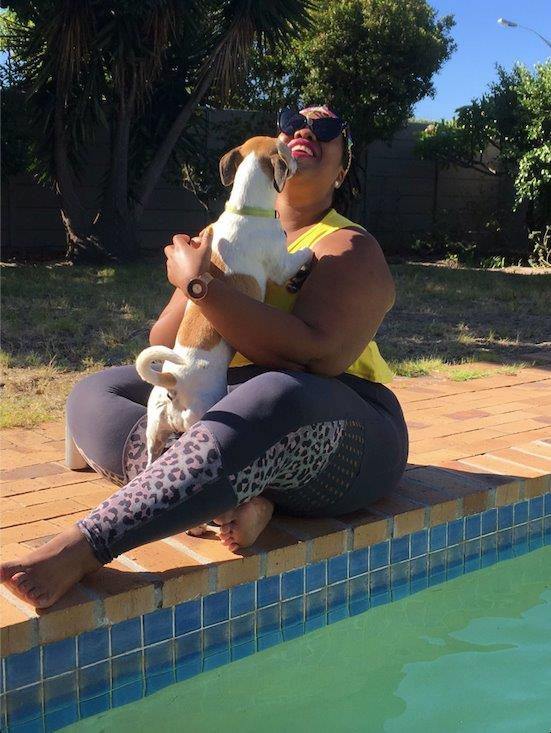
- Believe in your contributions because no one else is like you, you bring to the table a combination of things the next person will not.
- Be in love with and have passion for your career because if you don’t your path within that career will be a chore.
- Never give up because winners never quit, and quitters never win.
- Go for your dreams. Never let anything/anyone discourage you from reaching and far surpassing those set goals.
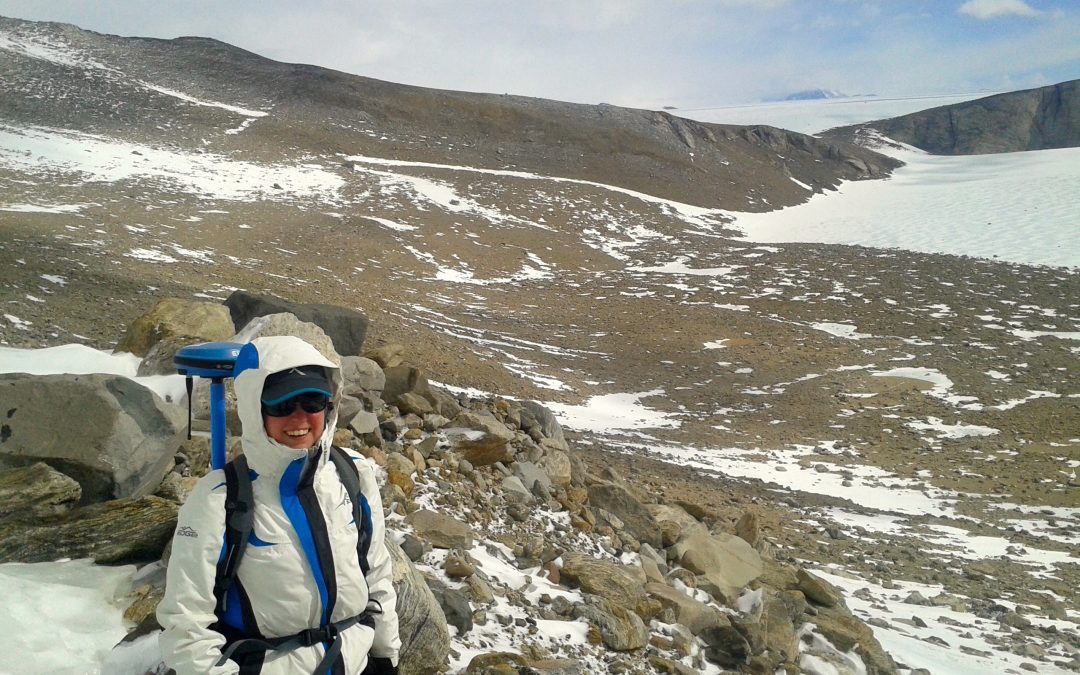
by Ria Olivier | Mar 1, 2020 | Antarctica, Fellowship, Marion Island, Research, SANAP, Science, Southern Ocean, Uncategorised, Women in Science
11 February 2020 was the International Day of Women and Girls in Science and 8 March 2020 is International Womens day. Within the SANAP environment there are many women, this article highlight four early women career scientists.
Liezel Rudolph is chair of the Association of Polar Early Career Scientists (APECS) of South Africa. She is a PhD student, working on cosmogenic nuclide surface exposure dating  of Marion Island in the sub-Antarctic. Her research is on the impact of various physical factors on landscape change, for example: animals (seals in particular) on soil properties and vegetation community composition; ice, above or below the ground surface. Geomorphology or better known as Physical Geography is her area(s) of Interest and more specifically, the processes behind
of Marion Island in the sub-Antarctic. Her research is on the impact of various physical factors on landscape change, for example: animals (seals in particular) on soil properties and vegetation community composition; ice, above or below the ground surface. Geomorphology or better known as Physical Geography is her area(s) of Interest and more specifically, the processes behind 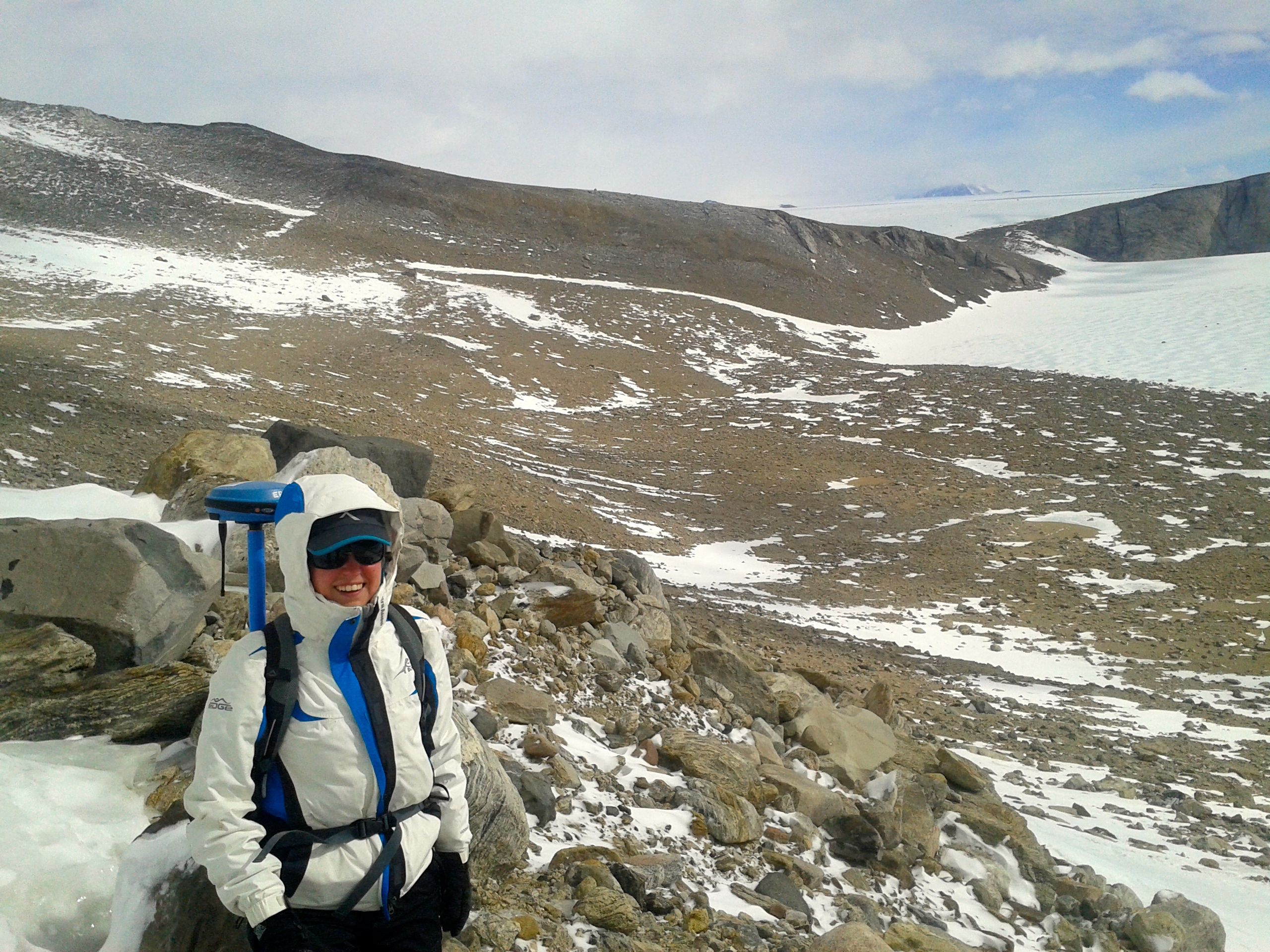 Periglacial Landforms and to a lesser extent Biogeomorphology. She is fascinated by cold and mountainous places, and thus prefer to work in environments like the High Drakensberg, Subantarctic Marion Island or Antarctica. Liezel is a lecturer at the University of the Free State, Bloemfontein and one of the founding members of APECSSA. Since June 2019 she is the APECSSA Chair. Her Master’s work on rock glaciers took her to Antarctica twice (2013/14 & 2014/15), while her Honors studies led to a visit to Marion Island (2011). Her PhD studies have since taken her to Marion Island again (in 2017), most recently in 2019.
Periglacial Landforms and to a lesser extent Biogeomorphology. She is fascinated by cold and mountainous places, and thus prefer to work in environments like the High Drakensberg, Subantarctic Marion Island or Antarctica. Liezel is a lecturer at the University of the Free State, Bloemfontein and one of the founding members of APECSSA. Since June 2019 she is the APECSSA Chair. Her Master’s work on rock glaciers took her to Antarctica twice (2013/14 & 2014/15), while her Honors studies led to a visit to Marion Island (2011). Her PhD studies have since taken her to Marion Island again (in 2017), most recently in 2019.
Kolisa Yola Sinyanya is a PhD. candidate in Oceanography at the University of Cape Town (UCT). Her Ph.D. 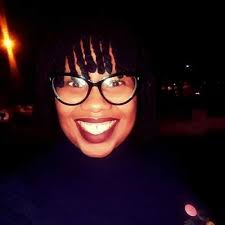 research is part of a growing body of work that critically examines biogeochemical cycling in the ocean, particularly regions that are currently under-sampled. The research aims involve exploring phytoplankton community dynamics and microbe-nutrient interactions in the Indian Ocean, including subtropical and Southern
research is part of a growing body of work that critically examines biogeochemical cycling in the ocean, particularly regions that are currently under-sampled. The research aims involve exploring phytoplankton community dynamics and microbe-nutrient interactions in the Indian Ocean, including subtropical and Southern 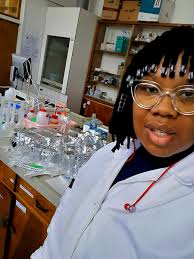 Ocean waters. To-date, Kolisa has been awarded the Advancing Womxn Fellowship in the Department of Oceanography. She is a Black Women in South Africa Fellows of 2019. In 2019 she was nominated as one of the Inspiring Fifty Women in STEM South Africa. Kolisa has a passion for learning science and for sharing her science and this PhD programme has allowed her to engage in effective science communication through both public speaking and scientific writing. Kolisa’s work has also been documented in the academic communication magazine, The Conversation Africa. Earlier this year she was invited to be on the “New Voices” panel at the annual Nature, Environment and Wildlife Filmmakers Congress. Sinyanya is committed to increasing the visibility of women in STEM and to that end, she runs a blog called Women In Science Hub.
Ocean waters. To-date, Kolisa has been awarded the Advancing Womxn Fellowship in the Department of Oceanography. She is a Black Women in South Africa Fellows of 2019. In 2019 she was nominated as one of the Inspiring Fifty Women in STEM South Africa. Kolisa has a passion for learning science and for sharing her science and this PhD programme has allowed her to engage in effective science communication through both public speaking and scientific writing. Kolisa’s work has also been documented in the academic communication magazine, The Conversation Africa. Earlier this year she was invited to be on the “New Voices” panel at the annual Nature, Environment and Wildlife Filmmakers Congress. Sinyanya is committed to increasing the visibility of women in STEM and to that end, she runs a blog called Women In Science Hub.
Daniela Monsanto is a PhD Candidate at University of Johannesburg.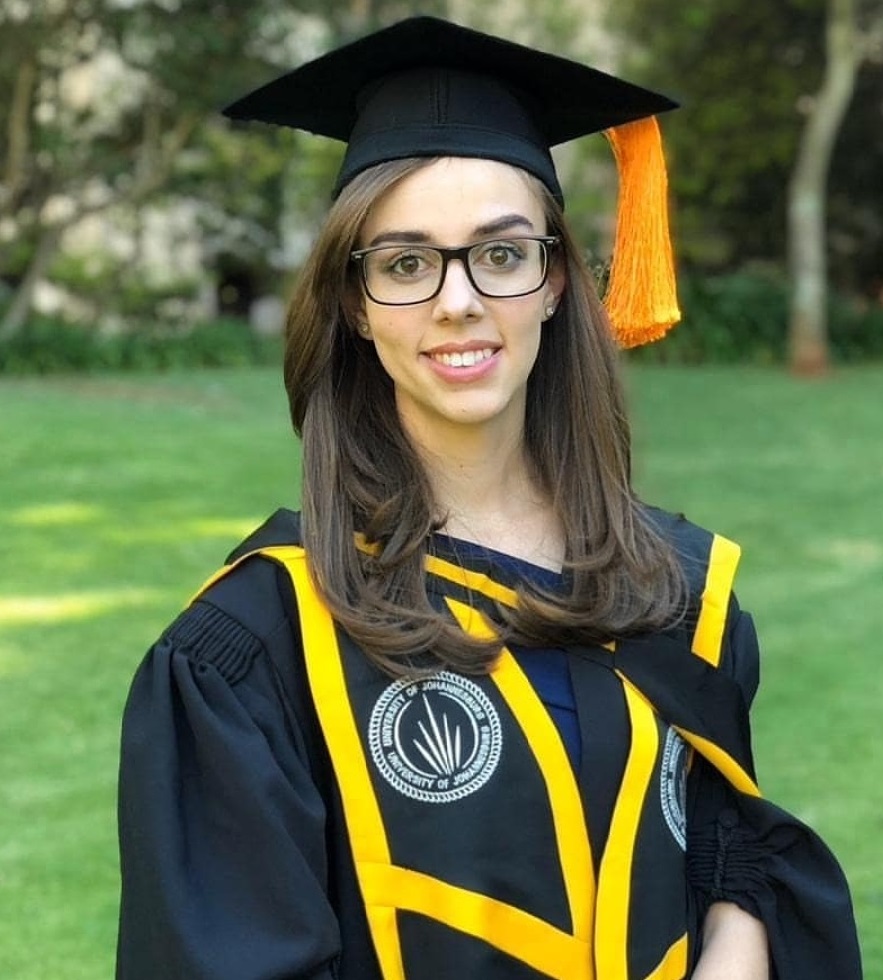 She has just been awarded the HJ Scoonbee medal for the best MSc Dissertation in Zoology(UJ) Her work documented the fine scale genetic patterns in a springtail species on Marion Island. Daniela is using next-generation sequencing technologies to develop a suite of informative markers (including whole gnome assembly) to address ecological and evolutionary questions of the springtail species, Cryptopygus antarcticus travei, on Marion Island. Her work will allow us to identify the forces that impose strong selection
She has just been awarded the HJ Scoonbee medal for the best MSc Dissertation in Zoology(UJ) Her work documented the fine scale genetic patterns in a springtail species on Marion Island. Daniela is using next-generation sequencing technologies to develop a suite of informative markers (including whole gnome assembly) to address ecological and evolutionary questions of the springtail species, Cryptopygus antarcticus travei, on Marion Island. Her work will allow us to identify the forces that impose strong selection 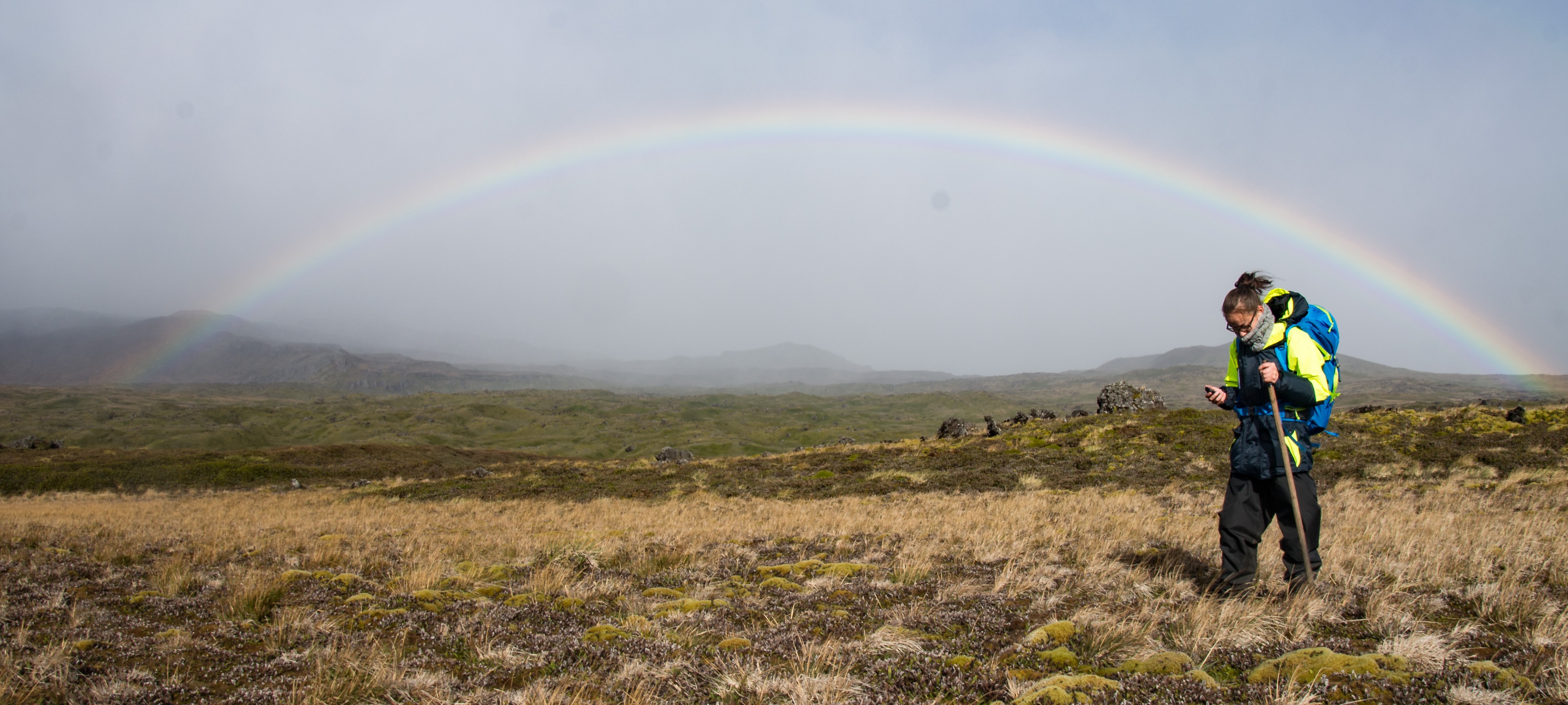 pressures on the organism and the genes that experience selection in response to environmental change. Her results highlighted complex spatial genetic patterns that could be driven by micro-habitat preferences and/or a fitness funnel driven by local adaptations. This complexity illustrates that individuals respond to environmental changes. Her results may bring about far-reaching implications for conservation management on Marion Island, highlighting the importance of considering fine-scale evolutionary processes in management plans. In essence, her results emphasize that conservation efforts are best addressed in a ‘bottom-up’ approach as opposed to a ‘top-down’ approach, which is the case for (Southern Ocean) biodiversity. She is passionate about her work and is extremely fond of the world down south. Daniela loves everything about nature, the outdoors, and sports, particularly soccer, of which she is part of a ladies team in a provincial league. She enjoys spending time with her friends and family, and in her free time, she enjoys the hobby of fishkeeping.
pressures on the organism and the genes that experience selection in response to environmental change. Her results highlighted complex spatial genetic patterns that could be driven by micro-habitat preferences and/or a fitness funnel driven by local adaptations. This complexity illustrates that individuals respond to environmental changes. Her results may bring about far-reaching implications for conservation management on Marion Island, highlighting the importance of considering fine-scale evolutionary processes in management plans. In essence, her results emphasize that conservation efforts are best addressed in a ‘bottom-up’ approach as opposed to a ‘top-down’ approach, which is the case for (Southern Ocean) biodiversity. She is passionate about her work and is extremely fond of the world down south. Daniela loves everything about nature, the outdoors, and sports, particularly soccer, of which she is part of a ladies team in a provincial league. She enjoys spending time with her friends and family, and in her free time, she enjoys the hobby of fishkeeping.
Rudzani Silima is the first Champion for the Antarctic Cities Youth Expedition(ACYE). 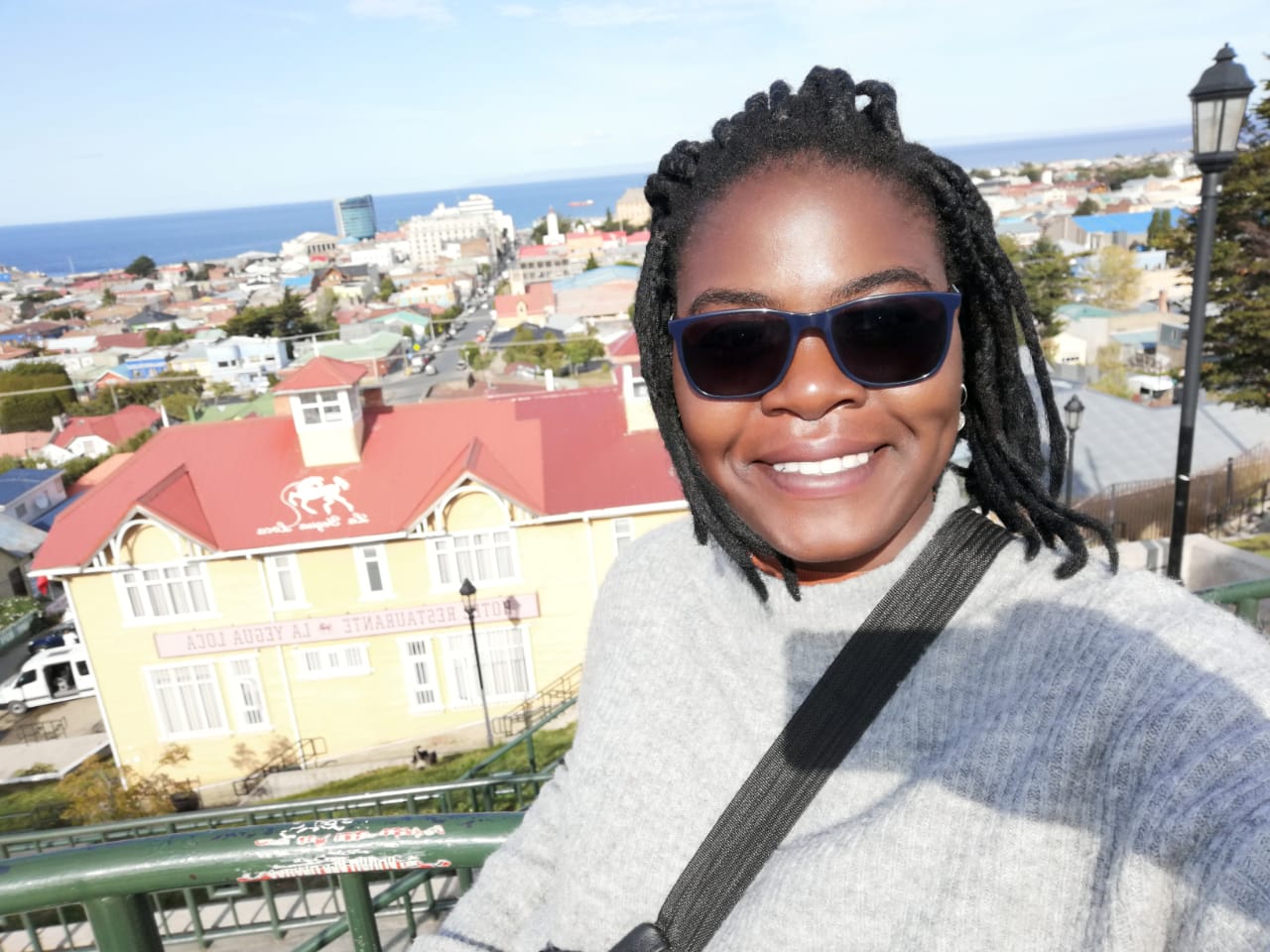 She is currently a Capetonian and studies towards a Masters in Physical/Chemical Oceanography, through the Nelson Mandela University. She was one of 41 students that qualified for this year’s SEAmester cruise and won the prize for best student on-board. During the SEAmester cruise, Rudzani showed her passion for science, nature and especially the Southern Ocean. She has
She is currently a Capetonian and studies towards a Masters in Physical/Chemical Oceanography, through the Nelson Mandela University. She was one of 41 students that qualified for this year’s SEAmester cruise and won the prize for best student on-board. During the SEAmester cruise, Rudzani showed her passion for science, nature and especially the Southern Ocean. She has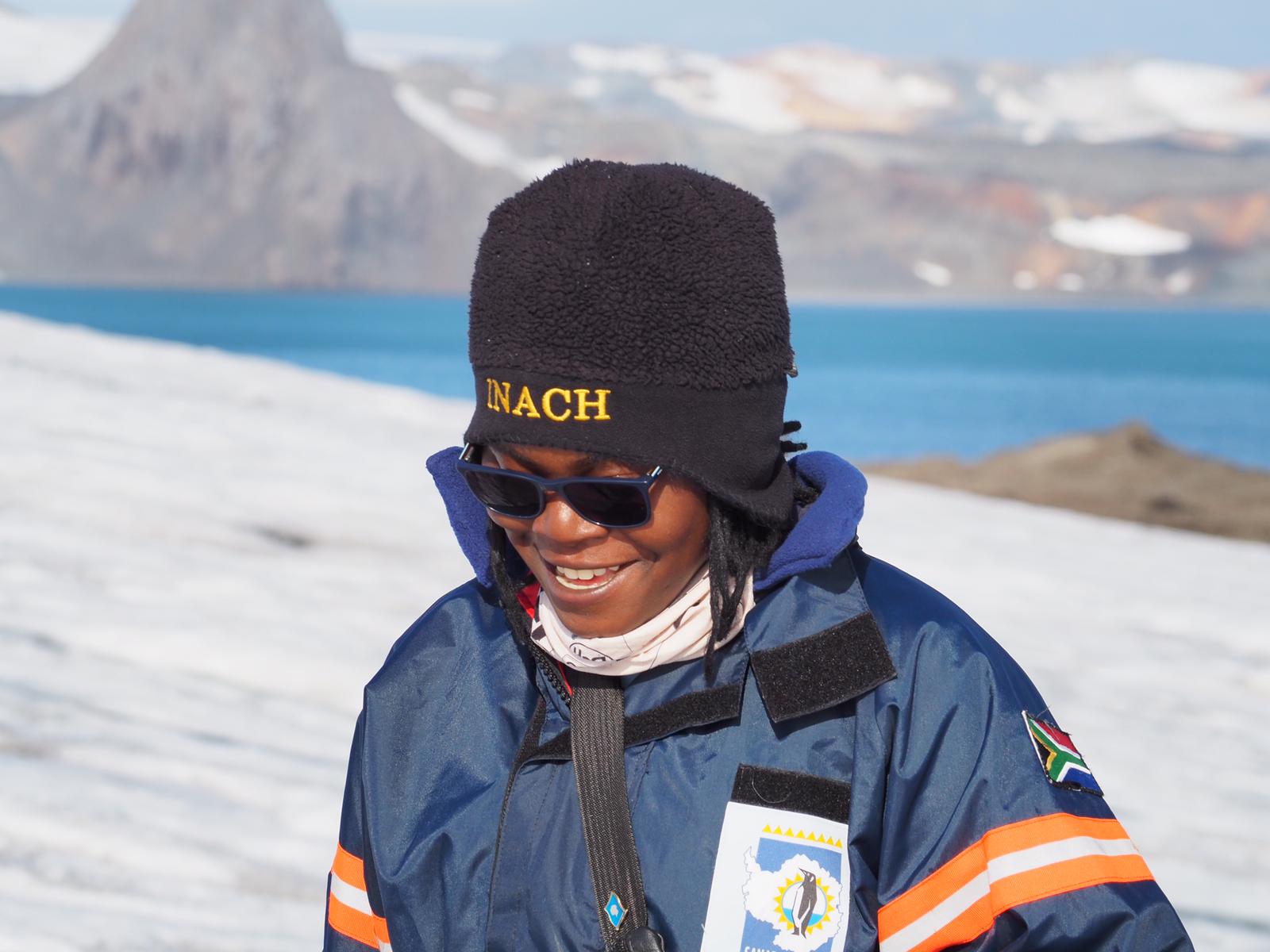 ambition that will not be held back and we are convinced that she will become an Antarctic ambassador at heart and further the connection between Cape Town and the Antarctic, as part of the network of gateway cities toward the Antarctic. Her expectation for the expedition before she left : “I look forward especially to interacting with the other young leaders and researchers chosen for this expedition to possibly establish connections. As an aspiring Oceanographer, Antarctica is an important milestone in my career, it represents the pinnacle of science, cooperation and diplomacy. To be the South African ambassador for this project is a privilege and is extremely humbling.” Rudzi arrived back in Cape Town on 28 February 2020 from the first ACYE
ambition that will not be held back and we are convinced that she will become an Antarctic ambassador at heart and further the connection between Cape Town and the Antarctic, as part of the network of gateway cities toward the Antarctic. Her expectation for the expedition before she left : “I look forward especially to interacting with the other young leaders and researchers chosen for this expedition to possibly establish connections. As an aspiring Oceanographer, Antarctica is an important milestone in my career, it represents the pinnacle of science, cooperation and diplomacy. To be the South African ambassador for this project is a privilege and is extremely humbling.” Rudzi arrived back in Cape Town on 28 February 2020 from the first ACYE
These early career women scientists have done presentations all over the world at international and national events where they represented South Africa and their institutions and have been authors and co-authors of articles in scientific magazines They are an inspiration to the girls of South Africa in Science.

 Liezel (Elizabeth) Rudolph obtained her Geography BSc and Honours degrees at the University of Pretoria, and a MSc at Rhodes University. She also has a PGCE from UNISA, which allowed her to teach Geography at Abbott’s College in Pretoria for a few years. She is currently in the final stages of her PhD (also in Geography) at the University of Fort Hare. She currently lectures Geomorphology at the University of the Free State. Her postgraduate research focussed on glacial and peri-glacial landforms and their response to (past and present) climate change. These studies afforded her opportunities to visit the research stations on Marion Island and in the Antarctic, working with SANAP-NRF funded programmes in geomorphology – Landscape Processes in Antarctic Ecosystems and Sub-Antarctic Landscape-Climate Interactions.
Liezel (Elizabeth) Rudolph obtained her Geography BSc and Honours degrees at the University of Pretoria, and a MSc at Rhodes University. She also has a PGCE from UNISA, which allowed her to teach Geography at Abbott’s College in Pretoria for a few years. She is currently in the final stages of her PhD (also in Geography) at the University of Fort Hare. She currently lectures Geomorphology at the University of the Free State. Her postgraduate research focussed on glacial and peri-glacial landforms and their response to (past and present) climate change. These studies afforded her opportunities to visit the research stations on Marion Island and in the Antarctic, working with SANAP-NRF funded programmes in geomorphology – Landscape Processes in Antarctic Ecosystems and Sub-Antarctic Landscape-Climate Interactions.









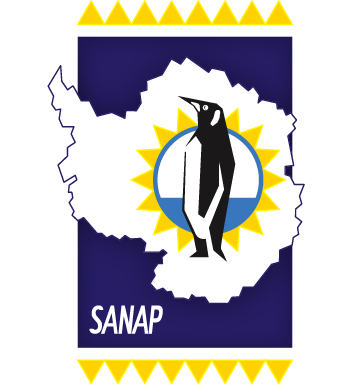



 Jess completed her Master’s Degree in Environmental Management in 2012 and started working in the corporate consulting world. She relocated to Cape Town in 2014 and got involved as a volunteer firefighter and started experimenting more with creative hobbies like drawing and painting. In 2018 she was offered a volunteer position for the summer takeover to
Jess completed her Master’s Degree in Environmental Management in 2012 and started working in the corporate consulting world. She relocated to Cape Town in 2014 and got involved as a volunteer firefighter and started experimenting more with creative hobbies like drawing and painting. In 2018 she was offered a volunteer position for the summer takeover to  “Lacking a good camera but having a desire to experience this incredible place to the fullest, and knowing that drawing is a fantastic meditation; I treated myself to a blank sketchbook and some fine-liner pens before departing on our journey. I like creative expression. It helps me clear my head and experience a place or a situation more deeply.”
“Lacking a good camera but having a desire to experience this incredible place to the fullest, and knowing that drawing is a fantastic meditation; I treated myself to a blank sketchbook and some fine-liner pens before departing on our journey. I like creative expression. It helps me clear my head and experience a place or a situation more deeply.”
 ANT{INK}TICA : There were initially no plans to publicise her art, but the opportunity was presented by the archivist at Antarctic Legacy of South Africa (ALSA) to publish it in a coffee table book. This is the first art publication from the Antarctic Legacy of South Africa. The book consists of 49 sketches and 3 poems, depicting scenes experienced by Jess during her Antarctic Expedition. Only 100 publications are available and will be signed by the artist. This publication will be a unique addition to Art Book Collections and Antarctic publications.
ANT{INK}TICA : There were initially no plans to publicise her art, but the opportunity was presented by the archivist at Antarctic Legacy of South Africa (ALSA) to publish it in a coffee table book. This is the first art publication from the Antarctic Legacy of South Africa. The book consists of 49 sketches and 3 poems, depicting scenes experienced by Jess during her Antarctic Expedition. Only 100 publications are available and will be signed by the artist. This publication will be a unique addition to Art Book Collections and Antarctic publications.  Jess’ message to you: “To get out there, challenge yourself. To believe in yourself and your ability. To try new things. Try harder, to judge yourself less and to never give up. To appreciate the experiences and lessons you’ve been endowed with and to help others along their way”. . Jess’ hope is that this book will shine a light for you, to show you that anything is possible. That persistence pays. Magic exists. And every day is a gift. Life is short, don’t waste a second.
Jess’ message to you: “To get out there, challenge yourself. To believe in yourself and your ability. To try new things. Try harder, to judge yourself less and to never give up. To appreciate the experiences and lessons you’ve been endowed with and to help others along their way”. . Jess’ hope is that this book will shine a light for you, to show you that anything is possible. That persistence pays. Magic exists. And every day is a gift. Life is short, don’t waste a second.
 probably the time to break from studies, our first “Saturday Student” in the Mid-Month series is Kolisa Yola Sinyanya or for those who are familiar with Twitter,
probably the time to break from studies, our first “Saturday Student” in the Mid-Month series is Kolisa Yola Sinyanya or for those who are familiar with Twitter,  She is a PhD candidate in Oceanography at the University of Cape Town (UCT). Her PhD research is part of a growing body of work that critically examines bio-geochemical cycling in the ocean, particularly regions that are currently under-sampled. The research aims involve exploring phytoplankton community dynamics and microbe-nutrient interactions in the Indian Ocean, including subtropical and Southern Ocean waters. To date, Kolisa has been awarded the Advancing Womxn Fellowship in the Department of Oceanography awarded under the “For womxn by womxn: conducting research in a field in which womxn are in short supply” category of a new initiative at UCT championed by the Office of the Vice-Chancellor. She is one of the researchers who were on 5-week cruise to Marion Island in the Sub-Antarctic Indian Ocean in 2017.
She is a PhD candidate in Oceanography at the University of Cape Town (UCT). Her PhD research is part of a growing body of work that critically examines bio-geochemical cycling in the ocean, particularly regions that are currently under-sampled. The research aims involve exploring phytoplankton community dynamics and microbe-nutrient interactions in the Indian Ocean, including subtropical and Southern Ocean waters. To date, Kolisa has been awarded the Advancing Womxn Fellowship in the Department of Oceanography awarded under the “For womxn by womxn: conducting research in a field in which womxn are in short supply” category of a new initiative at UCT championed by the Office of the Vice-Chancellor. She is one of the researchers who were on 5-week cruise to Marion Island in the Sub-Antarctic Indian Ocean in 2017. in effective science communication through public speaking, scientific writing and television features. In February of 2020, she presented one of her PhD chapters at Ocean Sciences Meeting in San Diego, USA. Towards the end of 2019, the new
in effective science communication through public speaking, scientific writing and television features. In February of 2020, she presented one of her PhD chapters at Ocean Sciences Meeting in San Diego, USA. Towards the end of 2019, the new  She has taken part in several science communication activities, including
She has taken part in several science communication activities, including 

 of Marion Island in the sub-Antarctic. Her research is on the impact of various physical factors on landscape change, for example: animals (seals in particular) on soil properties and vegetation community composition; ice, above or below the ground surface. Geomorphology or better known as Physical Geography is her area(s) of Interest and more specifically, the processes behind
of Marion Island in the sub-Antarctic. Her research is on the impact of various physical factors on landscape change, for example: animals (seals in particular) on soil properties and vegetation community composition; ice, above or below the ground surface. Geomorphology or better known as Physical Geography is her area(s) of Interest and more specifically, the processes behind  Periglacial Landforms and to a lesser extent Biogeomorphology. She is fascinated by cold and mountainous places, and thus prefer to work in environments like the High Drakensberg, Subantarctic Marion Island or Antarctica. Liezel is a
Periglacial Landforms and to a lesser extent Biogeomorphology. She is fascinated by cold and mountainous places, and thus prefer to work in environments like the High Drakensberg, Subantarctic Marion Island or Antarctica. Liezel is a  research is part of a growing body of work that critically examines biogeochemical cycling in the ocean, particularly regions that are currently under-sampled. The research aims involve exploring phytoplankton community dynamics and microbe-nutrient interactions in the Indian Ocean, including subtropical and Southern
research is part of a growing body of work that critically examines biogeochemical cycling in the ocean, particularly regions that are currently under-sampled. The research aims involve exploring phytoplankton community dynamics and microbe-nutrient interactions in the Indian Ocean, including subtropical and Southern  Ocean waters. To-date, Kolisa has been awarded the Advancing Womxn Fellowship in the Department of Oceanography. She is a Black Women in South Africa Fellows of 2019. In 2019 she was nominated as one of the Inspiring Fifty Women in STEM South Africa. Kolisa has a passion for learning science and for sharing her science and this PhD programme has allowed her to engage in effective science communication through both public speaking and scientific writing. Kolisa’s work has also been documented in the academic communication magazine, The Conversation Africa. Earlier this year she was invited to be on the “New Voices” panel at the annual Nature, Environment and Wildlife Filmmakers Congress. Sinyanya is committed to increasing the visibility of women in STEM and to that end, she runs a blog called
Ocean waters. To-date, Kolisa has been awarded the Advancing Womxn Fellowship in the Department of Oceanography. She is a Black Women in South Africa Fellows of 2019. In 2019 she was nominated as one of the Inspiring Fifty Women in STEM South Africa. Kolisa has a passion for learning science and for sharing her science and this PhD programme has allowed her to engage in effective science communication through both public speaking and scientific writing. Kolisa’s work has also been documented in the academic communication magazine, The Conversation Africa. Earlier this year she was invited to be on the “New Voices” panel at the annual Nature, Environment and Wildlife Filmmakers Congress. Sinyanya is committed to increasing the visibility of women in STEM and to that end, she runs a blog called  She has just been awarded the HJ Scoonbee medal for the best MSc Dissertation
She has just been awarded the HJ Scoonbee medal for the best MSc Dissertation  pressures on the organism and the genes that experience selection in response to environmental change. Her results highlighted complex spatial genetic patterns that could be driven by micro-habitat preferences and/or a fitness funnel driven by local adaptations. This complexity illustrates that individuals respond to environmental changes. Her results may bring about far-reaching implications for conservation management on Marion Island, highlighting the importance of considering fine-scale evolutionary processes in management plans. In essence, her results emphasize that conservation efforts are best addressed in a ‘bottom-up’ approach as opposed to a ‘top-down’ approach, which is the case for (Southern Ocean) biodiversity. She is passionate about her work and is extremely fond of the world down south. Daniela loves everything about nature, the outdoors, and sports, particularly soccer, of which she is part of a ladies team in a provincial league. She enjoys spending time with her friends and family, and in her free time, she enjoys the hobby of fishkeeping.
pressures on the organism and the genes that experience selection in response to environmental change. Her results highlighted complex spatial genetic patterns that could be driven by micro-habitat preferences and/or a fitness funnel driven by local adaptations. This complexity illustrates that individuals respond to environmental changes. Her results may bring about far-reaching implications for conservation management on Marion Island, highlighting the importance of considering fine-scale evolutionary processes in management plans. In essence, her results emphasize that conservation efforts are best addressed in a ‘bottom-up’ approach as opposed to a ‘top-down’ approach, which is the case for (Southern Ocean) biodiversity. She is passionate about her work and is extremely fond of the world down south. Daniela loves everything about nature, the outdoors, and sports, particularly soccer, of which she is part of a ladies team in a provincial league. She enjoys spending time with her friends and family, and in her free time, she enjoys the hobby of fishkeeping. She is currently a Capetonian and studies towards a Masters in Physical/Chemical Oceanography, through the Nelson Mandela University. She was one of 41 students that qualified for this year’s SEAmester cruise and won the prize for best student on-board. During the
She is currently a Capetonian and studies towards a Masters in Physical/Chemical Oceanography, through the Nelson Mandela University. She was one of 41 students that qualified for this year’s SEAmester cruise and won the prize for best student on-board. During the  ambition that will not be held back and we are convinced that she will become an Antarctic ambassador at heart and further the connection between Cape Town and the Antarctic, as part of the network of gateway cities toward the Antarctic. Her expectation for the expedition before she left : “I look forward especially to interacting with the other young leaders and researchers chosen for this expedition to possibly establish connections. As an aspiring Oceanographer, Antarctica is an important milestone in my career, it represents the pinnacle of science, cooperation and diplomacy. To be the South African ambassador for this project is a privilege and is extremely humbling.” Rudzi arrived back in Cape Town on 28 February 2020 from the first ACYE
ambition that will not be held back and we are convinced that she will become an Antarctic ambassador at heart and further the connection between Cape Town and the Antarctic, as part of the network of gateway cities toward the Antarctic. Her expectation for the expedition before she left : “I look forward especially to interacting with the other young leaders and researchers chosen for this expedition to possibly establish connections. As an aspiring Oceanographer, Antarctica is an important milestone in my career, it represents the pinnacle of science, cooperation and diplomacy. To be the South African ambassador for this project is a privilege and is extremely humbling.” Rudzi arrived back in Cape Town on 28 February 2020 from the first ACYE
